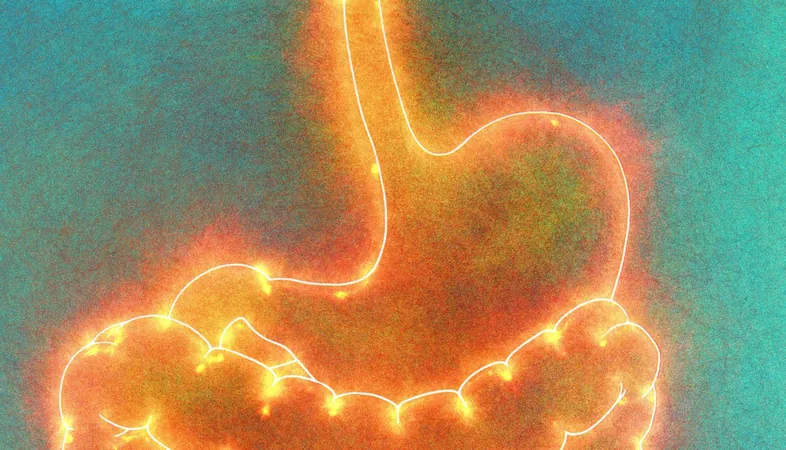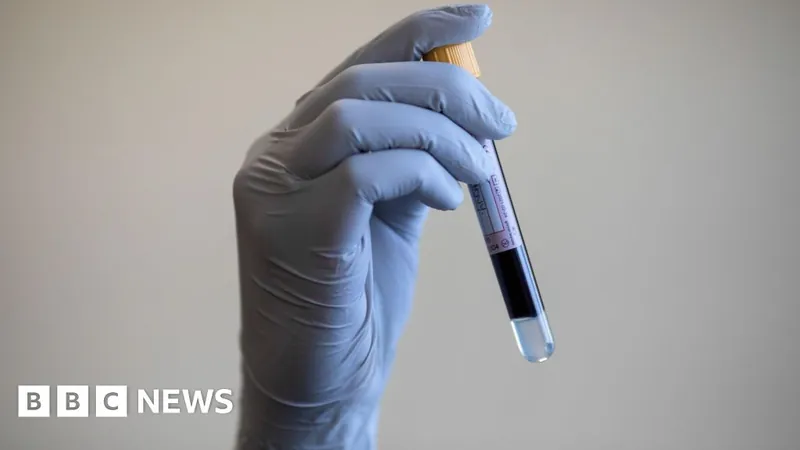
Unlocking Alzheimer's: Blood Biomarkers Could Be Key to Early Detection in Communities
2025-03-28
Author: Yu
Unlocking Alzheimer's: Blood Biomarkers Could Be Key to Early Detection in Communities
A groundbreaking study from Karolinska Institutet, Stockholm University, and the Stockholm Gerontology Research Center has unveiled the promising potential of blood biomarkers to predict Alzheimer’s disease (AD) and other forms of dementia in community settings. Published in Nature Medicine, the research analyzed data from over 2,100 dementia-free adults across Sweden over a staggering 16-year period, revealing a biomarker signature that predicts dementia onset with high accuracy.
While these biomarkers have proven effective at ruling out dementia, their capability to confirm a diagnosis remains limited. This exciting finding suggests that blood-based biomarkers could serve as scalable, less invasive tools for early dementia detection—an essential factor in improving patient outcomes, especially within community populations where traditional, invasive diagnostic methods are impractical.
Revolutionizing Dementia Detection
Early diagnosis of dementia, particularly Alzheimer’s, is crucial for timely intervention. Traditional methods, such as cerebrospinal fluid (CSF) analysis and brain imaging, often come with significant costs and risks, limiting their accessibility. Blood biomarkers provide a viable alternative, offering insights into the underlying pathological changes of AD—such as amyloid and tau accumulation and neurodegeneration—without the need for invasive procedures.
The Swedish study followed a cohort of individuals aged 60 and older, with 364 participants ultimately developing dementia. Among those diagnosed, a significant 58% were confirmed to have Alzheimer’s disease. Researchers tracked six key biomarkers: the amyloid-\(\beta\) ratios (A\(\beta\)42/40), phosphorylated tau (p-tau181 and p-tau217), total tau (t-tau), neurofilament light chain (NfL), and glial fibrillary acidic protein (GFAP).
Participants who developed dementia exhibited elevated levels of p-tau181, p-tau217, NfL, and GFAP, while showing lower levels of amyloid-\(\beta\)42/40. Notably, p-tau217 and p-tau181 were the strongest predictors of future dementia onset. The individual biomarkers delivered fair-to-good performance in foreseeing both all-cause and AD-related dementia within a decade.
Building a Better Diagnostic Tool
The study’s results showed that combining biomarkers further enhances predictive accuracy. The duo of p-tau217 and NfL emerged as the most reliable for predicting all-cause dementia (PPV of 43.1% and NPV of 95.1%), while p-tau217 and GFAP proved most effective for diagnosing Alzheimer’s-specific dementia (PPV of 23.5% and NPV of 95.6%).
Interestingly, the research revealed a weaker link between blood levels of amyloid-\(\beta\)42/40 and dementia risk, potentially due to lower amyloid concentrations in blood compared to CSF and its production in non-brain tissues like the liver and muscles.
A Future Filled with Potential
The implications of this research highlight the critical nature of blood biomarkers as tools for long-term dementia risk assessment, especially in community settings. The study's sensitivity analyses indicated strong predictive capabilities across various subgroups, notably younger participants, women, and individuals carrying the APOE \(\varepsilon\)4 genetic risk allele.
While these findings are groundbreaking, the researchers caution that real-world applications will likely require a combination of blood biomarkers with clinical or genetic markers for optimal accuracy.
In conclusion, by identifying a powerful biomarker signature, this study advances the frontier of Alzheimer’s research and reinforces the potential for earlier interventions. As the scientific community continues to refine these diagnostic tools, this research holds great promise for improving outcomes for those at risk of Alzheimer’s disease and other dementias. Stay tuned, as the age of blood tests for predicting Alzheimer's disease could revolutionize how we approach dementia diagnostics in the near future!





 Brasil (PT)
Brasil (PT)
 Canada (EN)
Canada (EN)
 Chile (ES)
Chile (ES)
 Česko (CS)
Česko (CS)
 대한민국 (KO)
대한민국 (KO)
 España (ES)
España (ES)
 France (FR)
France (FR)
 Hong Kong (EN)
Hong Kong (EN)
 Italia (IT)
Italia (IT)
 日本 (JA)
日本 (JA)
 Magyarország (HU)
Magyarország (HU)
 Norge (NO)
Norge (NO)
 Polska (PL)
Polska (PL)
 Schweiz (DE)
Schweiz (DE)
 Singapore (EN)
Singapore (EN)
 Sverige (SV)
Sverige (SV)
 Suomi (FI)
Suomi (FI)
 Türkiye (TR)
Türkiye (TR)
 الإمارات العربية المتحدة (AR)
الإمارات العربية المتحدة (AR)